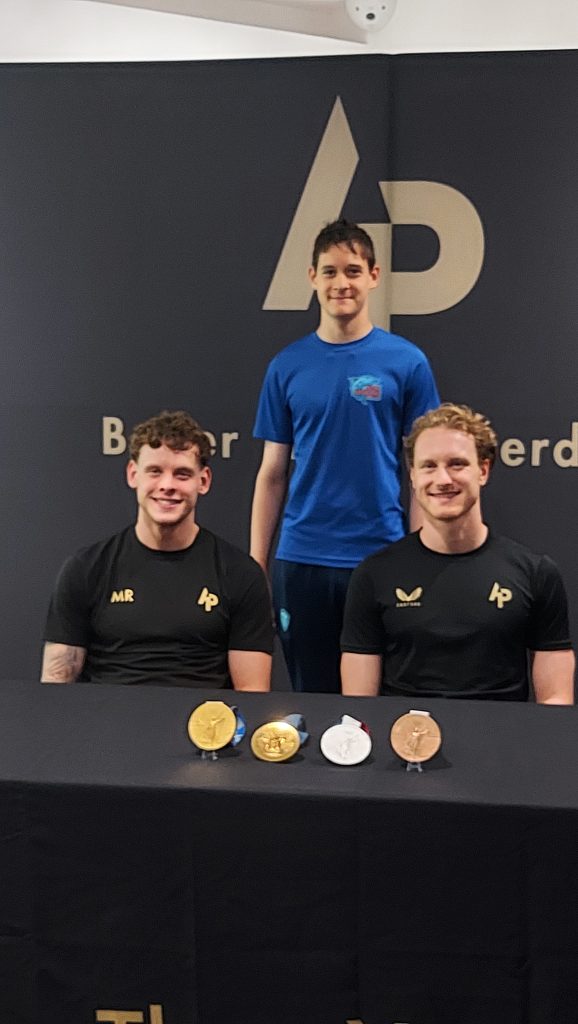When it comes to kids and sport, many parents feel pressure to choose the right activity and stick with it.
You might hear, “My child needs to specialise early if they’re going to get good at it,” or “We’ve just signed up for football — so we’ll focus on that now.”
But what if doing lots of different sports was actually better?
That’s exactly what was reinforced when my son met Olympic swimmers Matt Richards and Luke Greenbank — and what they said completely backed up everything I’ve believed since starting Leapfrog Sports.

🏅 What the Olympians Said
Both Matt and Luke were incredibly down-to-earth and generous with their time, and one thing really stood out:
“Don’t specialise too early. Try lots of sports, keep it fun, and focus on all-round skills.”
It was so reassuring to hear — because it backed up everything I’ve been saying since we first started Leapfrog Sports.
I’ve always been passionate about the benefits of multi-sport activities, and hearing Olympic athletes reinforce that message was a brilliant moment.
Coming from elite athletes at the top of their game, it really reinforced just how important it is for children to try a variety of sports when they’re young.
🧠 Why Variety Matters for Young Children
The science backs it up too. Young children:
- Are still developing core motor skills
- Learn best through play and repetition
- Benefit from experiencing different types of movement
That’s why multi-sport classes are ideal for this age. One week they might be running and dodging in handball, the next week using a bat in rounders, and then throwing in rugby or jumping in athletics.
They’re learning:
✔ balance
✔ agility
✔ coordination
✔ teamwork
✔ listening skills
✔ problem-solving
…without even realising!
❤️ What This Looks Like in Real Life
At Leapfrog Sports, we’ve had children who:
- Started off shy and unsure in one activity but found their confidence in another
- Tried a sport they’d never even heard of — and loved it
- Took those all-round skills into school PE lessons or clubs and surprised everyone
By not locking them into one sport too soon, we give them the space to discover what they enjoy and where they shine.
🙋♀️ But What If They Do Love One Sport?
That’s great too! If they’re naturally drawn to football, swimming or dance — amazing. But variety still helps them become more well-rounded and resilient.
It doesn’t have to be either/or.
You can let them specialise later, once they’ve built the physical and emotional toolkit to really enjoy it.
💬 Final Thought from a Parent (and Sports Coach)
I’ve seen first-hand how much happier and more confident kids are when they’re given the chance to explore. And it turns out the Olympians agree.
So next time you’re wondering whether to focus in or mix it up, just remember:
Variety isn’t a distraction — it’s a foundation.
👟 Want to See What a Multi-Sport Class Looks Like?
We run classes for ages 2–7 in Solihull where children get to try a different sport each week in a relaxed, fun, and supportive environment.
You can book a 4-week trial for just £15 here:
👉 www.leapfrogsports.co.uk/class-info
❓ FAQ: Multi-Sports vs. Specialising Early
Is it bad for kids to specialise in one sport too early?
Not necessarily — but focusing on just one sport too soon can lead to overuse injuries, burnout, or frustration if they lose interest. Variety helps children build a solid foundation of skills, stay motivated, and have fun exploring what they enjoy.
My child already loves football/swimming/gymnastics — should we just stick with that?
It’s great that they’ve found something they enjoy! But adding in other sports can support their progress. For example, handball can improve reaction time, and athletics can boost speed and coordination — all of which help in their “main” sport too.
Won’t they fall behind others if they don’t specialise?
Actually, it’s often the opposite! Children who try multiple sports early on tend to develop better all-round athleticism, confidence, and adaptability — giving them an edge when they do choose to specialise later on.
What age should children start to specialise?
Every child is different, but most experts (and Olympians!) agree that early primary school years are best spent exploring and having fun. Specialising can happen naturally later when they’ve found what they love and have built strong core skills.
Can my child join Leapfrog Sports if they’re already doing another sport?
Absolutely! Many of our children do football, dance or swimming alongside Leapfrog. Our sessions are a perfect way to complement their main sport, keep things fun, and boost their overall development.

Leave a Reply